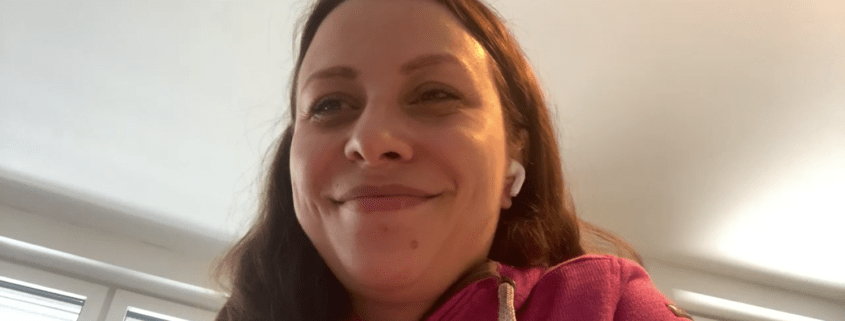On Tuesday, 6th April 2021, as part of the European Parliament Ambassador Schools project, students from the Novo mesto Grammar School organized a Zoom talk with MEP Irena Joveva. The main focus was on how the EU is managing the current challenges.
At the beginning, MEP Joveva gave them an overview of her regular working hours in Brussels (before and during the pandemic) and technology used in remote work during the pandemic. The students were particularly interested in the MEP’s life so far, from her multicultural upbringing and first job to her career in journalism and her decision to become active in politics.
During the one-hour debate, the most topical issues of vaccines and vaccination, the lack of communication, and the phenomenon of infodemic could not be overlooked. Joveva said that the European Union’s vaccine strategy was good and quite ambitious, but it only looks good on paper. Unfortunately, its implementation in practice is far from optimal, starting with the lack of sincere communication — both from the profession and, in particular, from politicians — with citizens. The different information on vaccines: the number of vaccines supplied; changes in national vaccination strategies; age limits; side effects – which changed from day to day – caused discomfort and mistrust.
“For citizens to have confidence in vaccines and the vaccination process, there needs to be honest two-way communication, and unfortunately, there is not; not only in Slovenia but also at the European level. Since decision-makers were mostly unable to clearly explain what was happening, people started to believe all kinds of misinformation and conspiracy theories circulating on social networks. That is why we in the European Parliament are going the extra mile for transparent information about current events to restore confidence in vaccination because it is our only lifeline for a return to, so to speak, a normal life.”
The students then turned the discussion on the pandemic toward digitalization and asked the MEP to comment on the rapid shift towards distance education and the use of technology used at work. Joveva admitted that she had quite a few problems with different apps, even though she is a member of the younger generation.
“Technology is advancing so fast that it can be challenging to keep up. The sudden increase in the use of technology in work and education has highlighted the fact that in many countries, we still have inadequate digital conditions in the 21st century — from a lack of access to computers or the internet to a lack of digital competencies. Since the pandemic, the European Parliament has adopted several resolutions on tackling the inequalities identified and on the future development of European education systems in the context of Covid-19. Gaps in digital education need to be bridged, as we in the EU were already aware before the pandemic. The Commission has been working with the profession to reform education at the EU level. The result of this collaboration is the Digital Education Action Plan, which will have a very significant impact on the functioning of established education systems in the future, in line with the digitization of the EU,” explained Joveva. She then continued that the coronavirus epidemic has indeed led to a significant leap in transferring learning activities to online tools. “In the future, it will be crucial to continue to raise young people’s awareness about the safe use of the internet. We have addressed this in the Digital Services Act, which significantly improves mechanisms for removing illegal content, protecting users’ fundamental rights online, flagging misleading and false information, and making algorithms transparent.”
At the end, Joveva asked the students to be curious, to ask questions, and, above all, to be actively involved in politics even after the Ambassador School project is over. “After all, you are the future of a better Europe for us all!” Two students summarized their impressions of the roundtable: “The conversation with Irena Joveva was very informative and interesting. We covered a wide range of topics, from the workings of the European Parliament, technology and the current situation, to the problems caused by the epidemic. I was very impressed by her sincerity and attitude towards us students.” (Anteja Ratajec)
“A conversation with Irena Joveva opened the door to the European Parliament. She briefed us on the work of the EP as well as on her work. During the discussion, we touched on some topical issues such as the fight to contain the epidemic, the work of MEPs “from home”, the position of women versus men in politics, and media freedom. She also openly presented her views on these topics and encouraged us to be curious, interested, and critical.” (Ajda – Lea Jakše)




Leave a Reply
Want to join the discussion?Feel free to contribute!